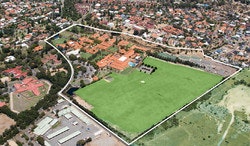Year 7 Japanese
Overview
The students will learn to introduce themselves and others in Japanese whilst learning about cultures throughout the world and participating in a mock-United Nations Presentation. They will develop their listening, speaking, reading and writing skills through the context of sport and hobbies and daily routine. The students will learn to read the Japanese script, hiragana and write numbers in kanji.
Topics
- The United Nations - introducing people from throughout the world, nationality, ages, clothes, foods, sports and hobbies
- Sport and Hobbies in Japan
- Daily Routine
- Reading Japanese script (hiragana)
- Traditional Japanese games
- Celebrating New Year in Japan.
Assessments
The students' achievements are assessed generally at the end of the topic. These assessments may vary in time but usually will take up to a lesson (50 minutes) to complete. Topics may last a term or longer and assessments are carried out according to the Outcomes below:
Outcome One: Listening and Responding
Outcome Two: Spoken Interaction
Outcome Three: Viewing, Reading and Responding
Outcome Four: Writing.
Reporting
Students will receive a grade upon the completion of the course:
A Excellent: The student demonstrates achievement that has greatly exceeded the expected standard. Their achievement is well beyond what is expected at this year level.
B Good: The student demonstrates achievement that exceeds the expected standard.
C Satisfactory: The student demonstrates achievement at the expected standard. The student is able to progress to the next level of learning.
D Limited: The student demonstrates achievement below the expected standard. The student demonstrates a quality of learning that is adequate for progression but will still need additional support or assistance to progress.
E Very Low: The student demonstrates achievement below the minimum acceptable for this year level.
Student expectations
Focus on developing cultural understanding and listening and speaking skills in Japanese. Students will be expected to:
- Review work covered in class
- Learn new words and expressions
- Practise speaking
- Research
- Revise for tests and quizzes.
